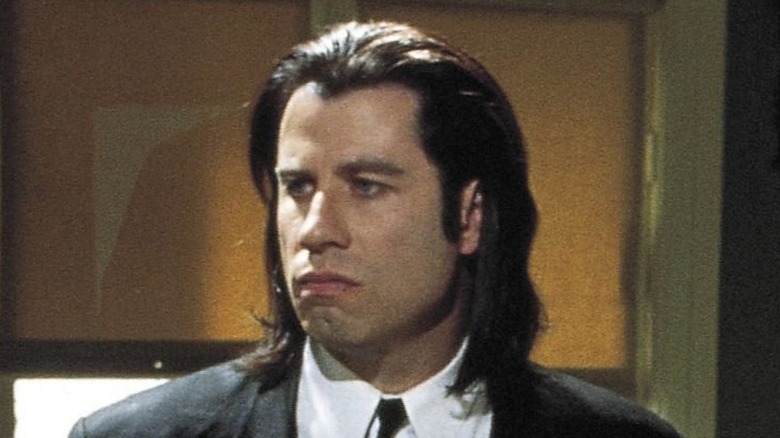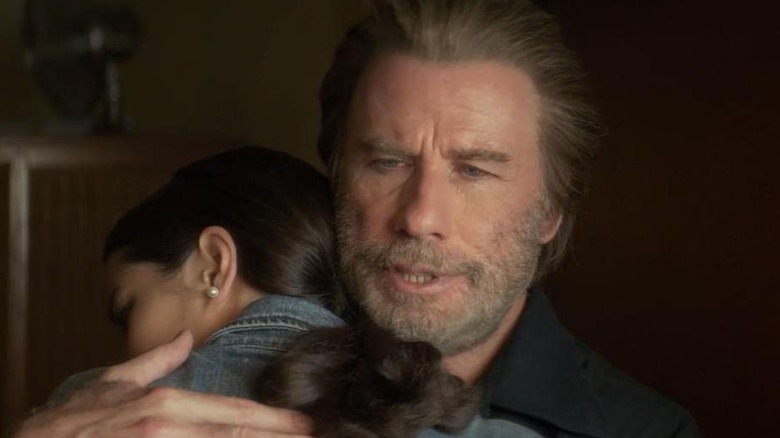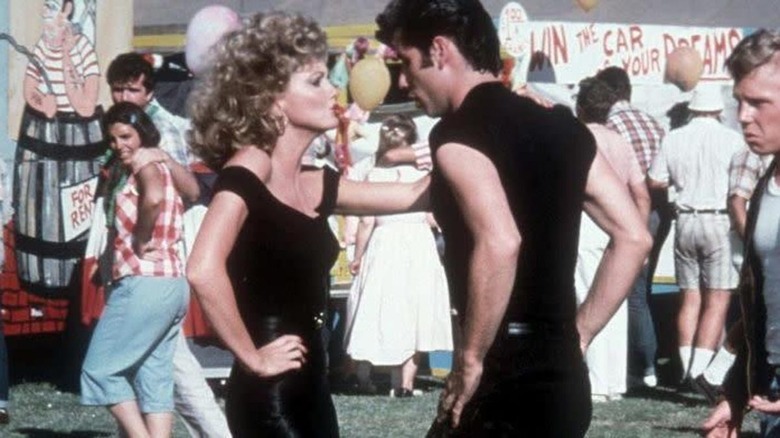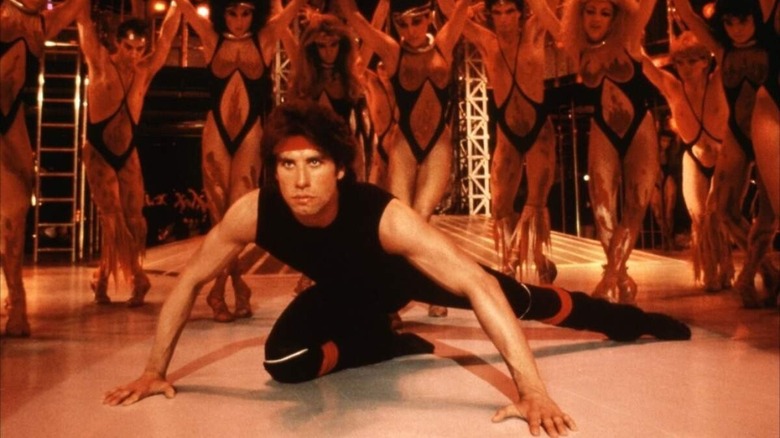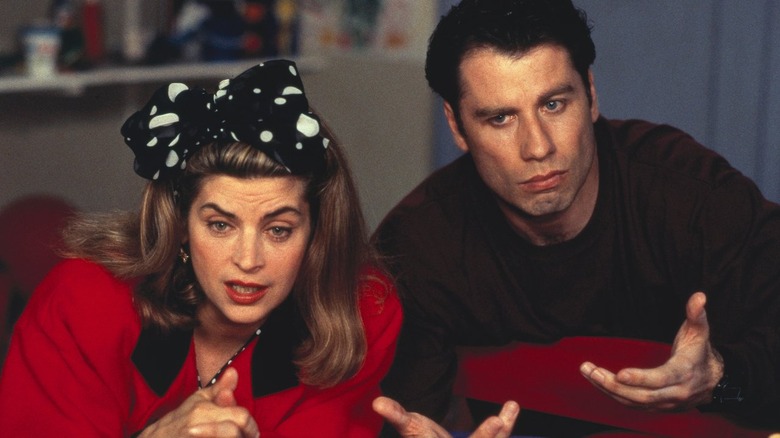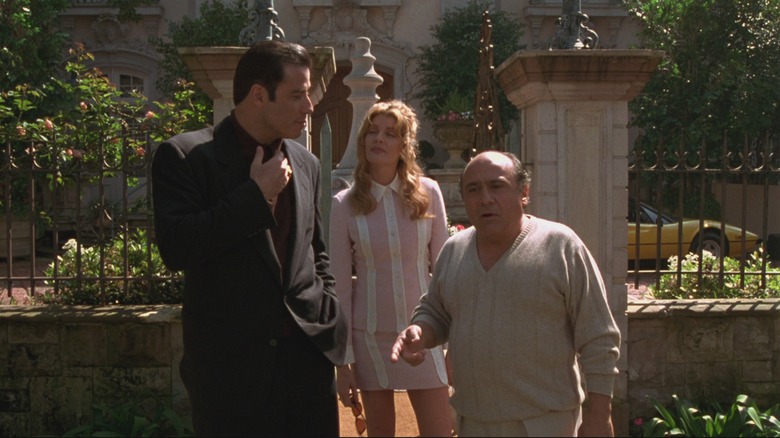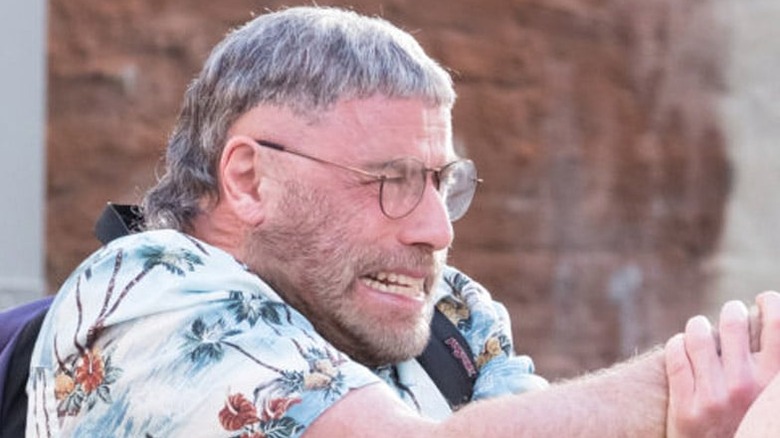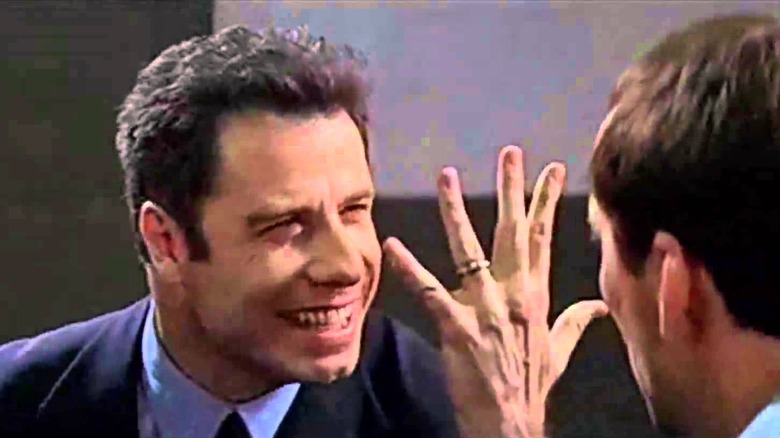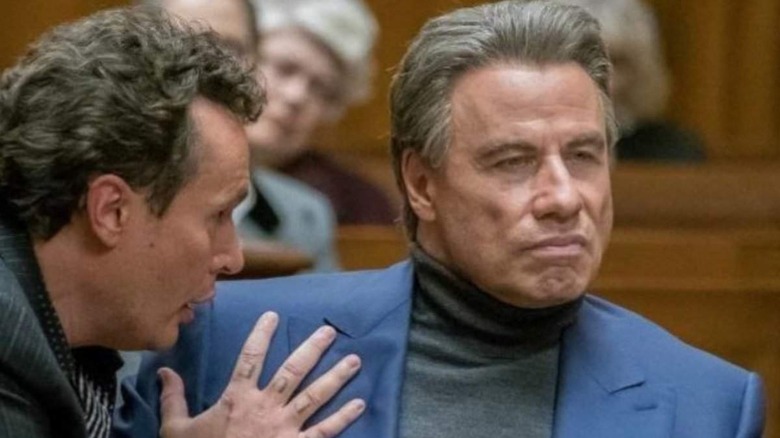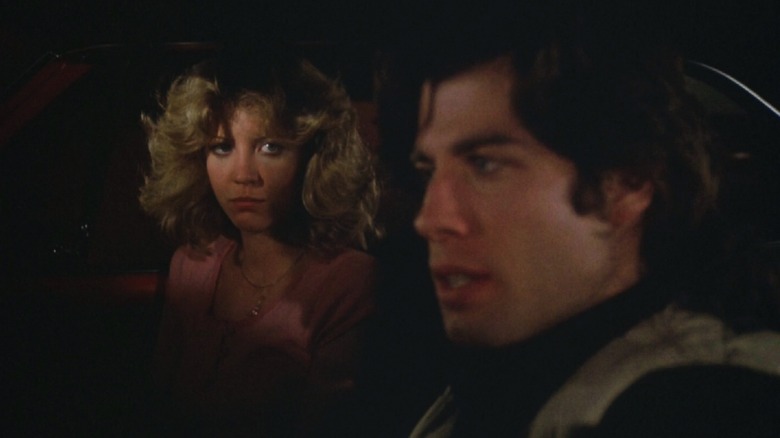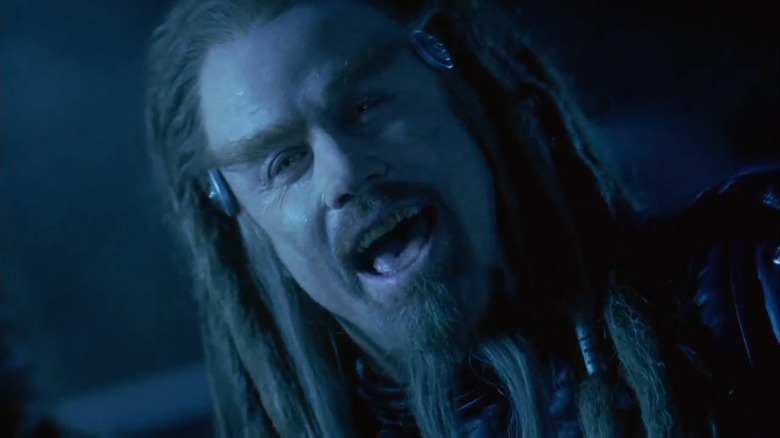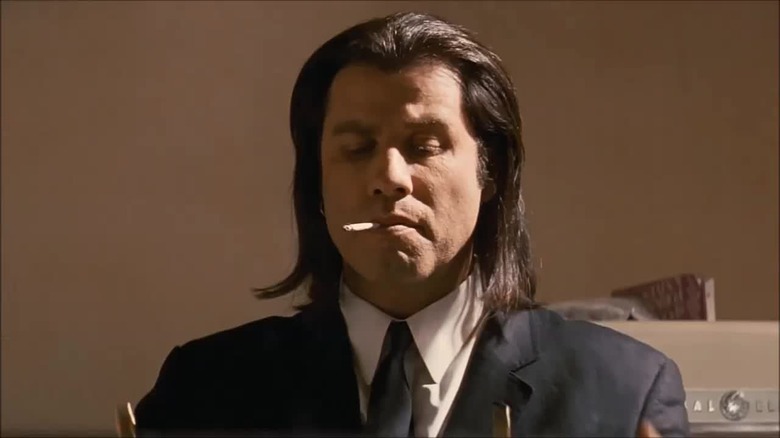John Travolta's 6 Best And 6 Worst Movies Of All Time
"That was pretty good, I guess" has never been uttered by anyone reviewing a John Travolta movie. That's because Travolta seems to be capable of only appearing in excellent, rewatchable classics or absolute cinematic bombs, with nothing in between.
Just look at his career. He first danced his way into millions of hearts in the most beloved musical hits of the 1970s. Then he floundered with a string of bad '80s rom-coms before finding a new home in classic '90s crime films. Then he crashed and burned again in the 21st century with a string of some of the worst films ever made. Each new project he takes on is a coin flip.
So what are the best Travolta movies of all time? What are the worst? We've listed 6 of each here. Get ready to cheer, and laugh, and cry, and ask yourself, "What the hell was he thinking?"
Warning: Spoilers ahead.
Worst: The Poison Rose
Judging by its impressive cast (including Travolta, Morgan Freeman, and Brendan Fraser) and its winning the award for "best directing international" at the Terre di Siena Film Festival, you might think "The Poison Rose" (2019) is a solid action thriller. You would be wrong.
Based on the novel of the same name by Richard Salvatore (who also joined George Gallo and Francesco Cinquemani as a co-writer for the film), the movie stars Travolta as Carson Phillips, a hard-drinking detective who takes on a routine missing person case, only to learn that it's the iceberg tip of a vast web of crime and conspiracy.
We've seen loglines like that before. While it didn't win any points for originality, it could have at least still delivered on execution. Sadly, that's where it flopped. The movie's both too competently made and too boring to be interesting in either direction, so it ends up being a paint-by-numbers snoozefest that offers nothing to the viewer.
The movie was deservedly panned and quickly forgotten. Luckily, as you're about to find out throughout this list, Travolta is no stranger to earning 0% on Rotten Tomatoes.
Best: Grease
Based on the 1971 musical of the same name, "Grease" follows two teenage lovers: greaser Danny Zuko (Travolta) and Sandy (Olivia Newton-John), an Australian exchange student. Problematic lyrics (Kenickie's infamously creepy "Did she put up a fight?" line from "Summer Nights" has not aged well, to say the least), a cast that's noticeably older than their high school characters, and an inexplicable ending where Zuko and Sandy drive off in a flying car aside, "Grease" has more than enough energy, wit, hair gel, and delightful musical ear-worms to work.
The movie was a smash hit, becoming the highest-grossing musical ever (at the time) and producing a soundtrack that closed out 1978 as the second best-selling record of the year in the United States, behind only the "Saturday Night Fever" soundtrack (which, notably, was also a Travolta-fronted hit from the previous year). Suffice to say, Travolta's career was off to a good start. Unfortunately, he had some rocky years ahead.
Worst: Staying Alive
1977's "Saturday Night Fever," about Tony Manero (Travolta), a kid from Brooklyn who deals with his teenage problems by dancing to disco, very nearly made this list as one of Travolta's "best" movies. Unfortunately, the movie's 1983 sequel, "Staying Alive," was worse than the original was good, and, well, we don't make the rules. We just enforce them. Sorry, John.
"Staying Alive," named after the hit Bee Gees tune of the same name, follows a slightly older Manero as he lives in squalor and struggles to break into Broadway. The movie lacked every element that made the original work. "Staying Alive" misses out on the inclusion of Brooklyn, which was a wonderful backdrop to the original movie. It also lacks the family drama, the high school troubles, and all the other relatable concerns that grounded the first film and provided enough context to make the dance sequences pop. Speaking of which, the movie also flops in the one arena it simply must excel in: the music numbers. "Saturday Night Fever" had no problems there, but the ones in "Staying Alive" are soulless and embarrassing to watch. Not helping the situation is the fact that by 1983, disco was cold and dead. Even if the movie didn't suck, it simply came too late to cash in on the disco craze. No wonder Manero can't find a job.
Oh, and it's also the oldest film to earn a 0% on Rotten Tomatoes, so there's that.
Best: The Thin Red Line
1998 was a strange year for movie doubles. For starters, there was the pair of "Antz" and "A Bug's Life" — two computer-animated family films about ant outcasts who save their colonies from threats to win the affections of the princess. Then came "Deep Impact" and "Armageddon," two schlocky, star-studded blockbusters in which astronauts fly into deep space to take out a killer asteroid before it destroys the earth. Then there were two highly acclaimed, equally star-studded World War II epics: "Saving Private Ryan" and "The Thin Red Line."
Travolta joined the latter film alongside Sean Penn, Woody Harrelson, Jared Leto, John Cusack, Adrien Brody, John C. Reilly, and other big-timers in what has to be one of the most impressive ensemble casts ever assembled. He has a relatively small role here — that of Brigadier General Howard Quintard — but any inclusion in this Terrence Malick war epic is an honor (not to mention a precious bright spot on Travolta's less-than-stellar filmography).
The movie is about men holding on to the last scraps of their humanity during WWII's bloody Guadalcanal Campaign. Miserable jungle combat against dug-in Japanese troops gets increasingly vicious and draws out the worst of the soldiers involved on both sides. The movie tends to get a bit self-indulgently melodramatic but largely holds up due to solid performances, a thought-provoking script, fierce action sequences, and one of Hans Zimmer's most beautiful scores.
Worst: Look Who's Talking Now
Thanks to the "Baby Geniuses" movies and "Baby Bob," a short-lived and rightfully forgotten sitcom from 2002, we now know that babies talking a few years too early isn't exactly a winning formula for side-splitting comedy. But back in 1989, the premise was just unexpected enough to turn the original "Look Who's Talking" into that year's fourth-biggest movie. It wasn't great, but this movie about an unnaturally sentient baby named Mikey (voiced embarrassingly by Bruce Willis, who narrates the life of his mother) did make money, and that was enough to warrant a few sequels. Unfortunately, said sequels didn't even hit the moderate bar set by their predecessor.
"Look Who's Talking Too" (1990), in which Mikey copes with the arrival of his newborn sister (voiced by Roseanne Barr), received notably less love from critics. But even this unnecessary, skippable sequel looks like a masterpiece next to the third and final film in the "Look Who's Talking" trilogy: 1993's "Look Who's Talking Now."
In this movie, James (Travolta) and Mollie (Kirstie Alley) expand the family once again, with the addition of a pair of dogs. If you're going to do a second sequel to a property like this and have already focused one movie on the birth of a sibling, we suppose adding pets isn't the worst idea. By this point, though, the formula was too played out to work. Critics weren't impressed, and it now stinks up the filmographies of everyone involved.
Best: Get Shorty
An actor like Travolta is sublime at his best and laughable at his worst — and his worst tends to happen when he overacts ("Face/Off" is a notable exception). Still, a competent director can use a restrained performance from the guy. Just play it cool, Johnny. Try not to use your face muscles too much.
Luckily, he was on the ball in "Get Shorty," a 1995 gangster comedy film directed by Barry Sonnenfeld and based on Elmore Leonard's novel of the same name. Travolta stars as Chili Palmer, a cool loan shark who gets wrapped up in a film production after traveling to Los Angeles to pick up a casino debt from Harry Zimm (Gene Hackman), who produces B movies. In the end, Palmer realizes Hollywood is just as merciless and cutthroat as his current gig.
Travolta didn't need any bombast because the story itself was so outrageous. Filled with twists and turns, double-crosses, shootouts, and switcharoos, it becomes a delightful parody of crime films and wisely refuses to take itself too seriously at any point. Characters are sleazy, selfish low-lifes mesmerized by the trashy glitter of Hollywood, and Travolta's Palmer finds himself right at home in the middle of it all. His even-keeled, subtly comedic turn as the lead character nabbed him a well-deserved Golden Globe for Best Actor in a Musical or Comedy Film.
Worst: The Fanatic
The year is 1978. You just left the theater after watching "Grease." While driving home, you and your date chat about how between that movie and "Saturday Night Fever," up-and-coming pretty boy John Travolta has a bright career ahead of him. Then you crash the car and slip into a coma that lasts 41 years. When you wake up, you try to make up for lost time. While exploring this newfangled "internet" thing, you see a trailer for something called "The Fanatic," starring John Travolta. Curious to see what Travolta is up to (only the biggest blockbusters, surely!), you click the link.
That guy in the bowl cut and backpack strangling celebrities — that's not John Travolta, is it? The Oscar-nominated, irresistible late-'70s heartthrob with the golden voice and limber hips? It can't be.
Oh, but it is. Look at him. Look what he has become. Maybe you even watch the movie. How bad can it be?
Bad. That's how bad it can be. Directed by Fred Durst of Limp Bizkit infamy (no, we're not kidding), "The Fanatic" (2019) follows Travolta as Moose (yes, really, Moose): a handicapped paparazzo who stalks celebrities, invades their homes, and threatens their lives. It could've been a commentary on our celebrity-obsessed culture. But it isn't. It's a commentary on how far John Travolta has fallen. His first line in the film is, "I can't talk too long. I gotta poo." That's probably all you need to know.
You long for the coma.
Best: Face/Off
If you saw the plot summary of "Face/Off" in a vacuum, chances are you'd either skip it or watch it with the expectation that it would be a glorious, unintentionally hilarious schlock-fest. Check it out: John Woo (maker of hyper-violent action shoot-'em-ups like "The Killer" and "Broken Arrow") directs this spy thriller in which an FBI detective (John Travolta) literally swaps faces with the serial killer (Nicolas Cage) he's chasing. Read that again. There are so many red flags in that description we don't know where to start. John Travolta. Nicolas Cage. Swapping faces? They can't be serious.
But "Face/Off" was for real. Somehow it threaded the needle perfectly between silly and exciting, never taking itself too seriously but still somehow delivering genuine action movie thrills. As for the performances, well. It doesn't need to be said that both Nicolas Cage and John Travolta can turn in some rancid performances when they feel like it. But when the stars align, as they did here under Woo's assured direction, they can be delightful to watch even in their hamminess. Seeing these two literally play each other, with all the wacky expressions and mannerisms you'd imagine, truly is a once-in-a-lifetime experience.
The movie won a handful of well-deserved awards and nominations, most notably an Oscar nomination for Best Sound Editing and two wins at the Saturns for Woo (Best Director) and Best Writers Mike Werb and Colleary.
Worst: Gotti
From the first two "Godfathers" to "Goodfellas" and "Casino," the best mob flicks rank as some of the greatest films ever made. John Travolta is no stranger to the subgenre, having played a hitman in "Pulp Fiction," a loan shark in "Get Shorty" a few years later, and a killer in "Face/Off" — all great, rewatchable films he should be proud of. Then came the news that he would star as infamous mobster John Gotti in the upcoming biopic "Gotti" (2018). After years of flops, maybe a return to gangster films would be just what the doctor ordered for Travolta's floundering career.
But it wasn't to be. "Gotti," which spent nearly a decade in development hell after it was announced, saw a revolving door of directors and at different points had legends like Al Pacino and Joe Pesci attached. It was finally finished and dumped in theaters in 2018. The film's message was apparently that Gotti, the head of the Gambino crime family who ultimately was found guilty of everything from tax evasion to obstruction of justice and murder, was actually a good guy because he loved his kids. Along with the lousy writing, directing, and acting, this sympathetic portrayal was also heavily criticized.
Critics did praise the makeup work, though. We suppose that's something.
Best: Carrie
Movies based on Stephen King's books are hit or miss. At the bottom of the list are laughable dumps like the recent and highly disappointing "Dark Tower" movie, "The Nightflier," and "Dreamcatcher." Somewhere in the middle are made-for-TV movies like 1990's "It" and "Salem's Lot." Then there are just good movies, like "Cujo," both halves of 2017's "It," and "Misery." Above even them are several films that leap past their source material and rank among the greatest of all time, like "The Shining," "The Green Mile," and "The Shawshank Redemption." The last three alone make for some pretty stiff competition, but be sure not to sleep on 1976's "Carrie."
Based on King's first novel, the film stars Sissy Spacek as the title character Carrie, a socially awkward teen who's tormented by her fanatically religious mother and several vicious high school bullies. Towards the end of the film, Carrie is unexpectedly voted Prom Queen, but this is a ruse: bullies (including Travolta's Billy Nolan character), rigged the vote merely to position Carrie onstage, where they dump a bucket of pig blood on her in front of the entire school. She snaps, losing her mind and using supernatural powers to get revenge on her tormentors. In the end, she destroys the school and kills scores of innocent people.
It's one of the best and most influential horror films of all time. If you haven't seen it, do it now. With the lights on.
Worst: Battlefield Earth
"Battlefield Earth," based on a 1982 science fiction novel by Scientology founder L. Ron Hubbard, is a monument to incompetence that has to be seen to be believed. It's impossible to catalog all the ways it falls short of whatever mark it was aiming for. Where do we begin? The screenplay is startlingly inept. Our protagonist is Jonnie Goodboy (Barry Pepper), a caveman who leads enslaved humans to victory over alien oppressors after learning to fly jets using flight simulators, which still inexplicably work despite being mothballed for the 1,000 years after Earth was invaded.
If the dizzying Dutch angles the movie is inexplicably littered with don't make you nauseous, the layers of bad makeup Travolta is caked in should do the trick. He plays Terl, an alien tyrant who runs a gold-mining operation on earth and feeds rats to humans. The script is bad enough without the acting choices Travolta makes throughout the film, which are nothing short of astonishing. He giggles and guffaws his way through the entire script and delivers his lines with the same lack of self-awareness that makes movies this embarrassing possible to begin with.
The movie is so historically, thunderously bad that it not only swept the Razzies that year but was revisited by them in 2010, winning a well-earned "Worst picture of the decade." The only saving grace here is that if aliens ever do invade, one look at this movie will have them fleeing for their lives.
Best: Pulp Fiction
From "Jurassic Park" to "Schindler's List" and "Toy Story," the '90s gave us some of the greatest films ever made. But even with all that competition, you could make an excellent argument for "Pulp Fiction" as the decade's crown jewel. The movie follows two hitmen, a boxer, and a gangster couple in several interlocking accounts of LA's criminal underworld. It blew the doors off the indie film industry, established Quentin Tarantino as one of the most powerful filmmakers of the modern era, and inspired legions of cheap imitators. Notably, it also reinvigorated John Travolta's career.
It couldn't have come too soon. "Grease" and "Saturday Night Fever" were distant memories by the time the '90s rolled around, and news that Travolta had taken a role in an indie project by a no-name director certainly didn't do much to change the perception that he was a has-been.
But then the gleefully violent, delightfully stylish movie came out. It was an instant Hollywood sensation, with particular praise reserved for its inventive, slick screenplay and memorable characters. Travolta, who played cool hitman Vincent Vega, was taken seriously for arguably the first time in his career. Critically speaking, it was mostly downhill from there. But many actors would sign on for a bad movie or two if it meant getting something this good in their filmography. And Travolta proved once and for all that with proper direction and a good script, he can hold his own with the best.
